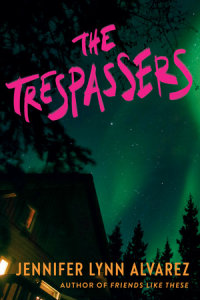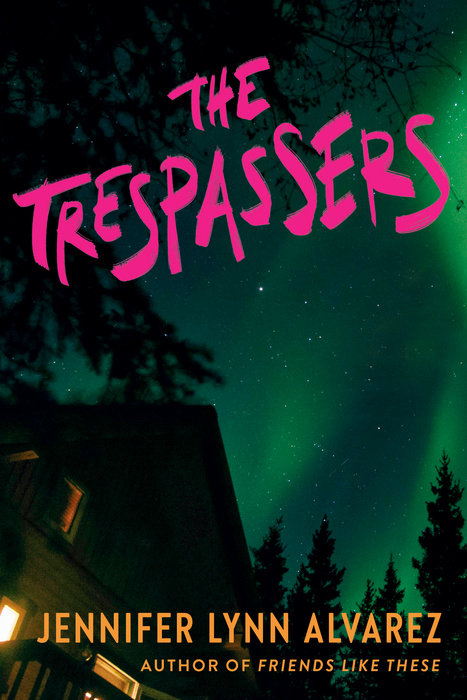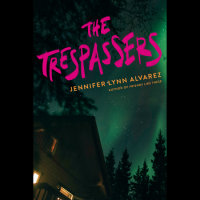ONE
Finley, now
I squeeze the throttle on my snow machine and speed across the flat, scrubby Alaskan taiga. When I find them, they will tell me the whole truth about Valentine’s Day--about what happened to Jason Walker--and then I will turn them over to the police.
Best friends aren’t always the best friends.
My blood races as I imagine Mya, Eli, and River having another secret meeting without me. I don’t trust them; maybe I never could. The trouble the four of us got into as children rushes back to me--sneaking out, cutting school, poaching salmon, and lying. The mischief ended after my dad died and Mom and I fled Alaska. Mom believes Dad’s last act scared me straight, but that’s not it. In LA, I met better people. It’s that simple. I followed the rules instead of Mya’s rules. Then I moved back.
“You ruined my life, Mya!” I scream into the wind.
And Jason Walker’s life.
As I skim the flatlands, the spindly trees blur past and the pale northern sun reflects off the snow. There’s the charred spruce Eli set fire to years ago. It’s become a landmark on River’s wilderness property. It means I’m close to the frozen pond and the fishing hut.
A wind gust tries to blow me off my seat. I slow the machine and scan the terrain. No matter what I find out about Jason, I’m in massive legal trouble. Nothing can change that now.
I gun the engine and the snow machine launches off a snowdrift and lands with a thump that tosses my body into the air. I miss the seat on my way down. Panicking, I squeeze the throttle tighter and the machine drags my legs through the snow. My shin strikes a rock and pain sizzles up my leg. Then the sled’s double runners slide onto the smooth frozen pond, propelling it faster. Ahead is a brown shape, the fishing hut.
My hands break loose and I tumble free. The snow machine veers off as I slide face down across the ice like a hockey puck.
When my body eases to a halt, I flip over, gasping for air.
Three figures stand outside the hut, their heads covered in hooded jackets--Mya, River, and Eli. Coldness engulfs me. One of the boys is carrying a hardwood bat used to bludgeon fish to death. He twirls it, and his spiked boots grip the ice as he walks toward me. The girl--Mya--has wide, rounded eyes.
“Finley!” she shouts.
I curl into a ball and cover my head. Blood drips from my leg. “Stay back,” I rasp.
“You’re the one chasing us.” Then they surround me.
My best friends.
TWO
Finley, nine weeks earlier
Whoever said you can never go home again was wrong because here I am, back in Alaska. Mom and I spent the past four years in sun-soaked Los Angeles, and when we arrived in Anchorage last week, I expected the Last Frontier to chew me up and spit me out. But no. Alaska welcomed me into her frozen arms with a fond, if vampiric, hug.
Our two-story townhome borders a nature park with walking trails and an icy lagoon. Behind it the snow-veiled Chugach Mountains scrawl across a purple sky. It’s morning, but sunrise is hours away. We moved back in the middle of winter and my last semester of high school. I left behind two favorite teachers, two great friends, and that lovely orb we call the sun. Here, daylight will rise and fall while I’m at school. I’ll see the sun on weekends, if it’s not snowing.
“You got this, Finley Dunn,” I say as I apply my lip gloss in the mirror. Soon, I’ll be face to face with my old friends Mya Green, River Madden, and Eli Kalluk, and things with them were not good when Mom and I left. We’ve kept in touch, but it’s not the same as hanging out every day. I can’t gauge their true feelings about my return. They claim they’re happy, but . . . I don’t believe it. I blow out a breath and hunt for my boots. Unable to find them, I burst into Mom’s bedroom. “I can’t find my mukluks.”
She eyeballs me while curling her hair. Mom starts her new job today, and her bathroom counter looks like a bomb went off. “We just bought them, Fin. Ouch! Let me get ready.” She sucks her finger where she burned herself on her iron.
“But have you seen them?”
Mom waves one arm. “Look at my mess. Am I the one you should be asking? I can’t believe you unpacked and organized your entire bedroom but lost your brand-new boots.”
My dad’s mother died a few months ago and left me this townhome in her will. Now Mom’s bedroom is piled with stuff Gran collected over the past eighty years. She’s right, it’s a mess.
“Never mind.” Pulling out my phone, I message my group chat with Mya, Eli, and River: How cold is it gonna be?
Bro, it’s winter, Eli writes back.
Cold, says Mya.
Message received. Don’t ask dumb questions. I slide my phone back into my pocket. River didn’t respond at all, which is not unusual. He’s never been glued to screens, but his silence worries me. My return will spark memories--not all of them good. I need to make things right with him, but I don’t think there’s anything I can say that will return us to the way we were.
The four of us met in preschool, the only kids in class who weren’t cheechakos, the Alaskan term for newcomers, or military brats from Elmendorf Air Force Base. Our parents got along, too, and our families did everything together--parties, vacations, adventures, and sleepovers. We were insular, communal, and a little bit criminal. Eli’s family grew black-market weed, River’s dad avoided paying federal taxes, Mya’s mom bribed the town council, and my family poached salmon out of the river behind our house. We were wild, but I felt safe. Protected.
It was fantastic, until my dad did what he did and Mom and I got the hell out of Alaska.
We never planned to return to Los Anchorage, but after Gran died she left me her townhome, five thousand dollars, and a 2012 Volvo. Her will states I can’t sell the house until I’m twenty-five, so here we are. If the LA struggle taught Mom and me anything, it’s that you don’t pass up free housing.
I tread downstairs, pack my lunch, and message the group: Who wants a homemade skinny hazelnut latte? Kill them with kindness, I think.
Your California is showing, Mya writes back.
“Wait until you see me,” I mutter. I spent every dime I earned in LA erasing the old Finley Dunn--new clothes, trendy makeup, teeth-whitening strips, latest phone model, orthodontics, and hair treatments. I was full feral when I left Alaska, and while no one in LA bullied me to my face, I heard the whispers: Are those Wranglers? Do they sell hairbrushes in Alaska? Did she live outside? By the time I entered high school, feral Finn was dead and I had two new best friends, Olivia and Imani.
My phone pings. I want a latte, writes Eli. As a kid he would eat literally anything. It’s comforting to know he hasn’t changed even though I have.
Still no response from River. Is he upset about my return or just being a dude? Stomach gurgling, I craft two lattes and pour them into travel mugs.
Outside the kitchen window, lighted lamp poles pierce the darkness, revealing piles of months-old brown snow. Gran used to babysit us in this house, and my friends and I pretended to be Iditarod huskies, played tag between the cars, or raced across the street to explore the lagoon. Dad smoked salmon filets in the driveway with Mom hugging his waist. My chest tightens because I miss my dad. I have good memories before everything went to shit.
Mom appears downstairs. “Check the car.”
The memories dissolve. “What?”
“The mukluks. Check the car, and please don’t miss the bus, Fin. I don’t want to be late for my first day.” It irks me that I have to ride a school bus, but Gran’s old Volvo is in the shop getting “road-ready” for me.
I search Mom’s car and find my new mukluks. They’re a bit extra for a school day, but it’s January, and I’m about to stand at a bus stop in Alaska in the dark, so who cares about fashion? I rip off the tag and pull on a neck gaiter, a beanie, and a long down jacket, completely covering my cute outfit. I leave the house dressed for skiing, not high school. “Bye, Mom, love you.”
“Love you too!”
Outside I slam into a wall of freezing wind that rips the breath from my lungs and blasts stinging ice particles at my face. The lamp pole light struggles to pierce the darkness, and the snow blows sideways. My nostrils freeze shut. Balancing the two lattes, I trudge toward a group of younger students, none of whom are wearing mukluks. I wish I’d asked my friends to pick me up, but I was too chicken.
The students watch me approach. “Are you new?” a boy asks.
His friend bops him. “Have you seen her before, shithead?”
New is a slur in Alaska, and my chin juts. “I’m not new. I grew up here.” The group absorbs the fact that I’m dressed to summit Everest, and their eyebrows shoot up. Cheechako, one mouths. Whatever. When I get Gran’s Volvo, I’ll honk at these fools each time I drive past.
Headlights veer into the complex. I prepare to board, but it’s not the bus. It’s a lifted Ford Bronco with snow tires. The driver revs the engine and a deep, obnoxious rumbling assaults my ears. “Get a muffler,” I grumble. Then the window rolls down, revealing dimples, white teeth, and sandy brown hair.
My stomach somersaults. “River?”
He grins at me. “Hey, Finley.”
Even though I follow his account and have seen his recent photos, I expected him to look like he used to: wire-rimmed glasses, a skinny boy’s body, and tangled hair flopping over one eye.
He taps the Bronco. “Get in.”
“Uh, okay.” I race to the passenger side and climb into the warm car. “You didn’t tell me--”
“I wanted to surprise you.” His lips quirk as he helps me wrangle my heavy backpack onto the seat between us. “What’s in there, rocks?”
“Books.”
He shrugs and shifts into first gear. The Bronco jerks forward and I fly deeper into my seat, spilling droplets of latte onto my jacket. The younger students watch us drive away, shivering in the cold, and I decide not to honk at them when I drive by in the future. River nods toward my hot drinks. “Is one of those for me?”
He seems so . . . comfortable. Also not what I expected. “No, but if you ever checked your phone, I would have made you one.”
Emotions swirl behind his gold-flecked eyes. “Damn, Fin, it’s good to see you.”
My throat knots. “Really?”
He nods. “Yeah, really.”
When Mom and I left Alaska, River was in bad emotional shape. He’d ceased speaking to anyone and yanked out his eyebrow hairs one by one. He snapped out of it about a year later and the four of us started our group thread while I was living in LA. I’m not convinced his recovery is complete, or that he forgives me for what happened, but he looks good--really good.
Recalling our first kiss four years ago, I sip my latte and try to act cool. “You’ve changed.”
River smiles. “I’d say you’ve changed, too, but I can’t tell beneath that sleeping bag you’re wearing.”
“It’s cold!”
“Maybe to you.”
I lean back and enjoy the fact I’m sitting next to River Madden, in Anchorage, after four long years apart. His artful hands grip a steering wheel instead of handlebars, and his muscular legs press a clutch instead of bike pedals. Childhood memories overcome me, changing him from man to boy, boy to man. Mom always liked River best. “That kid plays as well indoors as he does outdoors. The others are wilder than a pack of raccoons.”
It’s as if my time in LA were a dream, except that my California pals, Olivia and Imani, sent me a message this morning: good luck on your first day. They seem a million miles away.
“You remind me of a girl I used to know,” River says. His mood is reflective as the dark road unfurls ahead of us. “She was tiny and cute. She glowed when she was happy.”
“Was she a firefly?”
“Yeah. She was always bugging me, a total pest.”
“I was not a pest.”
“You were, but who says I was talking about you?” He winks, and I laugh. Jesus, when did River learn to flirt?
We arrive at school, and Bartlett High looms like a cruise ship at port--a two-story structure of gleaming glass windows, welcoming throngs of student passengers into its hull. Even though it’s January, Valentine’s dance posters and decorations cover the glass and unexpected pleasure courses through me. I learned to enjoy school while I lived in Los Angeles, and Bartlett has been remodeled since I left. It looks more like a well-resourced college than a high school.
We’re early, and River idles the Bronco to keep us warm. I unzip my jacket and pull off my beanie, releasing my long blond hair. His gaze rakes across my loose jeans, tan skin, and fitted white top. His voice deepens. “LA looks good on you, Fin. Remember when we--”
“Kissed?”
His cheeks darken, and the car cabin shrinks. Our breathing is like the wind, gusting between us. His fingers trace down my forearm, then pull away. “When I think about the past, that kiss is what I remember. The rest is behind us, Fin. I can tell you’re worried, but don’t be. I’m okay. I’m not gonna break down or anything. Promise. I’m good and I don’t blame you for what happened.”
My heart judders. He’s told me this over text and I didn’t believe him, but hearing it out loud is different. He’s not mad. Maybe there’s a chance we can pick up where we left off. Four years and thirty-four hundred miles haven’t driven our kiss out of my head. It’s as if we’re fourteen again and back in his bedroom. My gaze falls to his lips.
A banging sound startles me as a massive human wearing an FTP beanie pounds on the windshield. My hand jerks, spilling my latte. “Is that . . . ?”
River cuts his engine and sighs. “Yup, that’s Eli, and there’s Mya.”
A disoriented feeling descends as Eli draws back from the window. He’s so much larger in person than in his photos. A girl stands beside him, staring at me. She’s pale and wire-thin, but taller than she was when I left. She wears thick makeup, and her black-dyed hair frames fierce eyebrows. I catch the glimmer of a diamond nose stud. It’s Mya.


